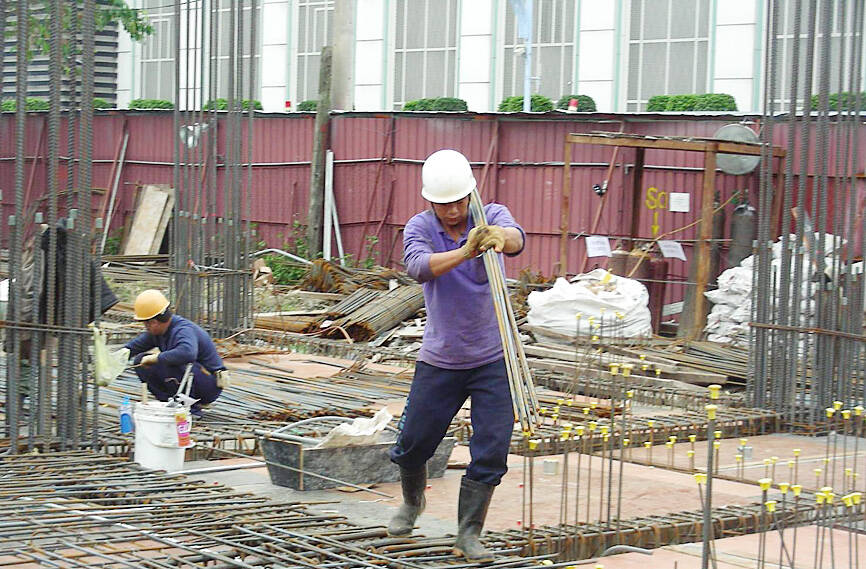The Ministry of Environment is to establish an alliance to propose heat response plans by the end of next month amid global climate change.
High temperatures are the most tangible signs of climate change for the public, and to help people adapt to a warmer environment, the ministry is setting up the High Temperature Response Alliance, Climate Change Administration Deputy Director-General Hsu Hsu-cheng (徐旭誠) said on Saturday.
The effort would be focused on protecting high-risk groups, such as agricultural workers and others who work outdoors, from heat hazards, he said.

Photo courtesy of the New Taipei City Labor Affairs Department
The ministry would also collaborate with local governments to create “cool maps” of comfortable outdoor activity sites for the public and would help shape a heat-response industrial chain, he said.
More than 70 percent of the heat transferred into buildings in Taiwan results from solar heat passing through glass doors or windows, while only about 20 percent is conducted through walls, National Cheng Kung University architecture professor Lin Tzu-ping (林子平) said.
Therefore, installing outdoor sun-shading structures is the most effective method to prevent solar heat from entering buildings, Lin said.
Indoor heat-blocking measures would be the second-best approach, such as using window blinds or covering glass doors or windows with thermal insulation film, he said.
Regarding electricity use, residential and commercial properties accounted for about 22 percent of total power consumption, he said.
While newly constructed buildings are required to meet energy efficiency standards, Taiwan lacks an effective energy-saving scheme for existing buildings, Lin said.
The Ministry of the Interior should follow the example of the Netherlands and mandate the disclosure of buildings’ energy efficiency ratings in profiles of housing for rent or sale, he said.
“Just as we would consider fuel consumption when buying a vehicle, we should also consider a building’s power consumption before renting or buying it,” Lin said, adding that tax deductions or other incentives could encourage landlords or building owners to disclose energy efficiency ratings.
Boosting buildings’ heat-blocking efficacy to reduce indoor temperatures can reduce power consumption and carbon emissions, Department of Comprehensive Planning Director Hung Shu-sing (洪淑幸) said.
While the Ministry of the Interior and the Ministry of Economic Affairs are responsible for promoting building energy conservation for the residential and commercial sector, the enviro`nment ministry would plan budgets to subsidize heat insulation projects for existing housing, Hung said.
The replacement of traditional windows with heat-blocking units and the enhancement of roof heat insulation at schools would be prioritized, with subsidy details to be discussed, she added.

The manufacture of the remaining 28 M1A2T Abrams tanks Taiwan purchased from the US has recently been completed, and they are expected to be delivered within the next one to two months, a source said yesterday. The Ministry of National Defense is arranging cargo ships to transport the tanks to Taiwan as soon as possible, said the source, who is familiar with the matter. The estimated arrival time ranges from late this month to early next month, the source said. The 28 Abrams tanks make up the third and final batch of a total of 108 tanks, valued at about NT$40.5 billion

Two Taiwanese prosecutors were questioned by Chinese security personnel at their hotel during a trip to China’s Henan Province this month, the Mainland Affairs Council (MAC) said yesterday. The officers had personal information on the prosecutors, including “when they were assigned to their posts, their work locations and job titles,” MAC Deputy Minister and spokesman Liang Wen-chieh (梁文傑) said. On top of asking about their agencies and positions, the officers also questioned the prosecutors about the Cross-Strait Joint Crime-Fighting and Judicial Mutual Assistance Agreement, a pact that serves as the framework for Taiwan-China cooperation on combating crime and providing judicial assistance, Liang

A group from the Taiwanese Designers in Australia association yesterday represented Taiwan at the Midsumma Pride March in Melbourne. The march, held in the St. Kilda suburb, is the city’s largest LGBTQIA+ parade and the flagship event of the annual Midsumma Festival. It attracted more than 45,000 spectators who supported the 400 groups and 10,000 marchers that participated this year, the association said. Taiwanese Designers said they organized a team to march for Taiwan this year, joining politicians, government agencies, professionals and community organizations in showing support for LGBTQIA+ people and diverse communities. As the first country in Asia to legalize same-sex

MOTIVES QUESTIONED The PLA considers Xi’s policies toward Taiwan to be driven by personal considerations rather than military assessment, the Epoch Times reports Chinese President Xi Jinping’s (習近平) latest purge of the Chinese People’s Liberation Army (PLA) leadership might have been prompted by the military’s opposition to plans of invading Taiwan, the Epoch Times said. The Chinese military opposes waging war against Taiwan by a large consensus, putting it at odds with Xi’s vision, the Falun Gong-affiliated daily said in a report on Thursday, citing anonymous sources with insight into the PLA’s inner workings. The opposition is not the opinion of a few generals, but a widely shared view among the PLA cadre, the Epoch Times cited them as saying. “Chinese forces know full well that